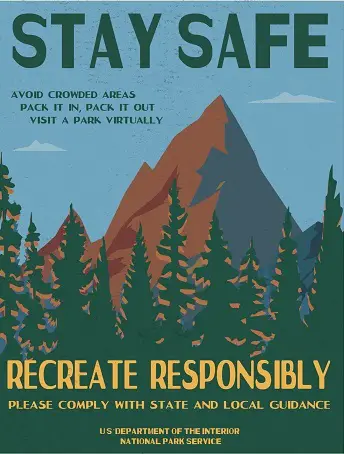Latest Guidelines Offer Tips For People Seeking Safe Ways To Recreate Outside This Summer
 |
WASHINGTON, June 30, 2020 -- As states and local communities continue to manage the COVID-19 pandemic, guidelines about what activities are safest and where people should visit continue to evolve. Many are seeking opportunities for outdoor recreation, including visits to the nation's public lands, waterways and public spaces like parks and trails.
With the summer season in full swing, the Recreate Responsibly Coalition is releasing an update to its tips, initially released in May with great success, for safely recreating outdoors. The coalition first came together two months ago as a group of two dozen organizations based in Washington State. Since then, the group has grown into a diverse, nationwide community of over 500 businesses, government agencies, nonprofits, outdoor media and influencers. The coalition's common ground is a shared love of the outdoors, a desire to help everyone experience the benefits of nature, and a belief that by sharing best practices, people can get outside safely and help keep our parks, trails and public lands open.
The overall #RecreateResponsibly message remains simple: We all have a role to play in keeping people, places and communities safe as we enjoy the outdoors this summer and beyond.
Importantly, the last month also has served as a vital reminder that we all can contribute to making society and the outdoors more inclusive and equitable, where everyone feels welcomed. The coalition has added a new foundational principle, calling on outdoors enthusiasts to do their part to help build a safe and welcoming outdoors for all identities and abilities.
The latest #RecreateResponsibly guidelines are:
- Know Before You Go—Check the status of the place you want to visit. If it is closed, don't go. If it's crowded, have a backup plan.
- Plan Ahead—Prepare for facilities to be closed, pack lunch and bring essentials like hand sanitizer and a face covering.
- Explore Locally—Limit long-distance travel and make use of local parks, trails and public spaces. Be mindful of your impact on the communities you visit.
- Practice Physical Distancing—Keep your group size small. Be prepared to cover your nose and mouth and give others space. If you are sick, stay home.
- Play It Safe—Slow down and choose lower-risk activities to reduce your risk of injury. Search and rescue operations and health care resources are both strained.
- Leave No Trace—Respect public lands and waters, as well as Native and local communities. Take all your garbage with you.
- Build an Inclusive Outdoors—Be an active part of making the outdoors safe and welcoming for all identities and abilities.


